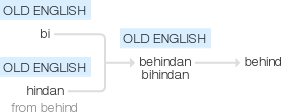Behind
Old English behindan, bihindan, from bi ‘by’ + hindan ‘from behind’.
wiktionary
From Middle English behinde, behinden, from Old English behindan(“on the back side of, behind”), equivalent to be- + hind. Compare Old Saxon bihindan(“behind”, adverb), Middle High German behinter(“behind; back”).
etymonline
behind (adv., prep.)
Old English behindan "at the back of, after," from bi "by" (see by) + hindan "from behind" (see hind (adj.)). The prepositional sense emerged in Old English. Figurative sense "not so far advanced, not on equality with" is from c. 1200. Euphemistic noun meaning "backside of a person" is from 1786. To do something behind (someone's) back "clandestinely" is from late 14c. Phrase behind the times is by 1826. Behind the scenes (1711) is from the theater; figurative sense attested by 1779.
